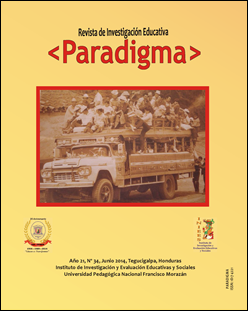Educational resilience from students due to the social risks generated by young soccer fans in Honduras
DOI:
https://doi.org/10.5377/paradigma.v21i34.1692Keywords:
Educational Resilience, Youth Soccer fans, Third Cycle of Basic EducationAbstract
In societies affected by violence, children, adolescents and young people have specific needs and vulnerabilities, as evidenced by high rates of social problems in this population: poor school performance, involvement in gangs, and emotional deprivation and materials. While affected, teens also become protagonist in the absence of a social mechanism to intervene early in the reproductive cycle of violence by providing them with effective support and opportunities for healthy social development.
In Honduras, the context of violence has increased and evolved in the implication it has on children and youth, including those who are already within the educational system. Educational communities are one of the main sources of protection available to adolescents and their families, as the environment where students coexist at this age. However, most of the time the school is not ready to understand the complexity of the phenomenon of violence, its nature, and evolution.
Consequently, educational institutions become generators of violence instead of protective spaces. When the measures taken against the risks faced by students fail the expected impacts, cycles of violence tend to recur with the next generations and evolving negatively. From this perspective, the Institute for Educational and Social Research of the National Pedagogical University (UPNFM) in Honduras with the sponsorship and support of the World Bank, has developed the present study on the evolution of the violence cause by youth soccer fans in schools, as well as the contribution provided by the understanding of the mechanisms of resilience that high school students develop due to this phenomenon. The findings from this study are intended to help develop relevant policies to influence educational strategies to prevent, respond to, and mitigate the effects of such violence within schools, and support students and their families in developing psycho-emotional behaviors that allow them to deal with situations of high social vulnerability. This educational task is ineludible for the educational system, as it is promoting academic learning.
The study is based on qualitative and quantitative techniques, taking a sample of 612 ninth graders, interviews with parents, teachers, and principals of two schools, one in the city of Tegucigalpa and one in the city of Choluteca. In both schools, the protective factors perceived by students from exposure to violence, include links to have family, friends, and teachers, coupled with a strong sense of belonging to your family, your school and the country. All these factors contribute to a positive self-perception of their skills and knowledge, which leads them to express very high goals for their future, most notably, complete their educational project.
DOI: http://doi.dx.org/10.5377/paradigma.v21i34.1692
<Paradigma> - Revista de Investigación Educativa. Año 21. No. 34: 9-69
Downloads
1640
Downloads
Published
How to Cite
Issue
Section
License
Transfer of Copyright
- The author, when sending the work, states that it is his will to give the Universidad Pedagógica Nacional Francisco Morazán the patrimonial rights that correspond to him as the author of his work.
- The rights here assigned include all economic rights (Reproduction, transformation, public communication and distribution) and are given without limitation in terms of territory; This Assignment is given for the entire duration term established in the current legislation in Honduras.
- The cession of the aforementioned rights does not imply the cession of moral rights over it, because in accordance with the provisions of the Copyright and Related Rights Law, Chapter II, of the Moral Rights, Article 34, Article 25 , these rights are inalienable, imprescriptible, indefeasible and inalienable.
- The research work or document must be original and have been done without violating or usurping rights of third parties, therefore, the work is exclusively authored and owns the same.
- In the case of any claim or action by a third party, as to copyright on the work in question, the author must assume full responsibility for the rights assigned.
- Upon completion of the Rights Assignment Form, the author states that the work has not been published in another way, that the rights on the work have not been assigned and that no encumbrance or limitation on their use or use is imposed on them.





